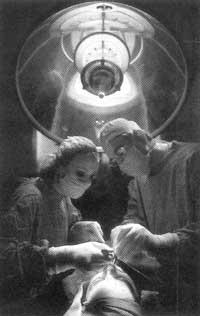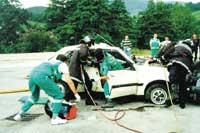Primary and specialized assistance
1995/04/01 Alvarez, Mikel Iturria: Elhuyar aldizkaria
Primary care is understood as the assistance that physicians and pediatricians provide to the family. This assistance is organized in most cases in Health Centers and Offices, especially since the proliferation of Health Centers in the last decade.
The specialized assistance is the one that develops in the ambulatory and especially in the hospitals. In this type of assistance it is necessary to differentiate two aspects: one, the assistance provided by the medical specialists of cupo and another, the one provided by the hierarchical doctors of the hospitals.
Much is written and written about the relations that have or not these two levels of assistance, and for many, the discrepancy is one of the biggest mistakes of the Public Health System. The scarce relationship between these two levels of care, according to many, produces a significant loss of resources or wealth and a lack of quality.
On the other hand, it is curious, everything that is published on the subject or almost everything that is published is written by professionals of first level, and you can hardly find something written by people dedicated to specialized activities. What does that mean?

At the end of last year, some professionals of the School of Public Health of Andalusia, in an article published in the magazine “Primary Care”, analyzed the relations between these two levels of care and, among other incidents, showed the opinion of some professionals of two different assists on the others.
In this way, according to this research, the professionals of the special or specialized assists despise those who devote themselves to the first line and consider that the professionals of first line instead of reducing demand would increase, since they would send the patients to the hospitals without any criteria. In addition, these professionals consider that first-class physicians are not decisive.
The reverse view is also not very good, since the opinion of the first on specialized assists is not very good either. Among them is the perception that the professional relationship of special assistance with the patient is cold, inhuman, partial and technified. In addition, in this article they were accused of using inefficiently resources or health wealth.
Thus being the opinion of one another, it is not surprising that mutual information is scarce and that coordination between both levels is historically irregular.
Following the aforementioned article, first-line physicians show interest in maintaining relationships with the hospital. This is mainly due to the creation of Primary Care Teams, since many professionals have trained in hospitals and look at the hospital as a “science source”. The contrary, of course, does not occur, that is, specialists in most cases do not believe that they can learn something from primary care.
But where does this kind of mistrust lead us?
One of the main problems of the hospitals at this time is mass. This massification is mainly manifested in waiting lists, both for surgery and for consultation or exploration.
But if the mass is noticeable nowhere, it is in case of emergency. In our Hospital, Hospital de Basurto, 21 people per 1,000 inhabitants are treated every month. Each year 100,000 emergencies are attended, ie 274 days. 80% of these cases occur immediately and many of them, although they are problems that can be solved in First Division, go through emergencies without going through First Division controls. However, the problem is not a simple solution and generates many debates.
We have to balance this system and to do so we need to strengthen relations between both parties. On the one hand, doctors and primary care professionals should be invited from time to time to hospitals, organizing courses, meetings, clinical debates on patients, etc. On the other hand, bring the specialists closer to Primary Care to educate, develop protocols and, consequently, among all we manage the existing demand.
Finally, if we want to really strengthen relations between Primary Care and Specialized Assistance, it is necessary to build information channels, which means an important investment in computing in the coming years.

Gai honi buruzko eduki gehiago
Elhuyarrek garatutako teknologia





